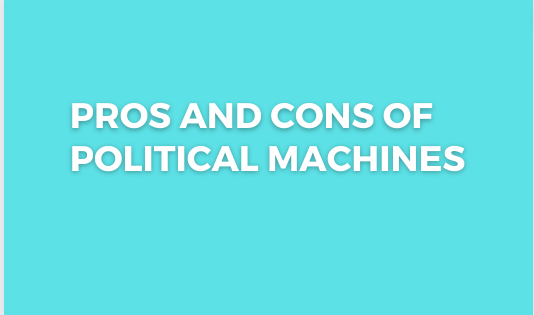Political machines are organized groups within a political party that wield substantial control over political affairs, often characterized by centralized power and influence. While they have played significant roles in shaping politics and delivering services, they are not without their criticisms. In this discussion, we will explore pros and cons of political machines, highlighting the key points associated with these entities.
Pros:
- Effective mobilization: Political machines excel at mobilizing voters and getting them to the polls.
- Improved access to government services: Machines provide constituents with better access to government services and resources.
- Job creation: Political machines can create employment opportunities through patronage appointments.
- Infrastructure development: Machines often prioritize infrastructure projects, leading to community improvements.
- Social welfare provision: Machines offer support to the underprivileged, providing aid, and addressing social issues.
- Strong grassroots networks: Machines build strong grassroots networks that connect with local communities.
- Ethnic and cultural representation: Political machines can empower marginalized ethnic and cultural groups by offering political representation.
- Consistent policy implementation: Machines can ensure consistent implementation of policies and initiatives.
- Effective campaign fundraising: Machines are often adept at raising funds for political campaigns.
- Stable governance: Political machines can provide stable and predictable governance through long-term leadership.
- Facilitate compromise: Machines can act as mediators, facilitating compromise and cooperation between different interest groups.
- Effective constituent service: Machines prioritize the needs and concerns of their constituents, providing responsive and personalized service.
- Political education and awareness: Machines engage in political education and awareness campaigns, fostering an informed citizenry.
- Promotion of community development: Machines actively promote community development projects, improving the quality of life for residents.
- Foster grassroots activism: Machines encourage grassroots activism and community involvement in decision-making processes.
- Skill development: Machines provide opportunities for individuals to develop political skills and engage in civic participation.
- Provision of public goods: Machines allocate resources for public goods such as parks, schools, and healthcare facilities.
- Representation of marginalized groups: Political machines can amplify the voices of marginalized groups and advocate for their rights.
- Encouragement of political participation: Machines encourage political participation among previously disengaged individuals.
- Promote stability during transitions: Machines ensure a smooth transition of power by offering experienced leadership and institutional continuity.
Cons:
- Corruption: Political machines are susceptible to corruption, leading to unethical practices and misuse of power.
- Lack of transparency: Machines often operate behind closed doors, lacking transparency and accountability.
- Undemocratic control: Machines concentrate power in the hands of a few, undermining democratic principles.
- Vote manipulation: Machines have been known to engage in voter fraud and manipulation to maintain control.
- Patronage and nepotism: Machines reward supporters with political favors and appointments, promoting favoritism over meritocracy.
- Marginalization of opposition: Machines often suppress political opposition, limiting diverse voices and viewpoints.
- Inequitable resource distribution: Machines tend to direct resources towards loyal supporters, neglecting those who dissent.
- Neglect of long-term planning: Machines may prioritize short-term gains over long-term planning and development.
- Lack of accountability: Machines may evade accountability for their actions and decisions.
- Erosion of public trust: Machine politics erode public trust in the political system and breed cynicism.
- Clientelism: Machines engage in clientelistic practices, treating voters as clients rather than active citizens.
- Undermining fair competition: Machines can stifle fair competition in elections, limiting political diversity and choice.
- Exclusion of marginalized groups: Political machines may exclude marginalized groups from participating in the political process.
- Influence of organized crime: Machines have historically been linked to organized crime, compromising the integrity of governance.
- Divisiveness and polarization: Machines often exploit divisions within society for their own political gain.
- Limited representation of diverse interests: Machines may prioritize the interests of their core supporters, neglecting diverse perspectives.
- Economic exploitation: Machines may engage in economic exploitation, favoring certain business interests over others.
- Dynastic rule: Machines can perpetuate dynastic rule by favoring political families and stifling new leadership.
- Suppression of civic engagement: Machines discourage active civic engagement, creating apathy and disengagement among voters.
- Slow adaptation to change: Machines can be resistant to change and innovation, hindering progress and responsiveness to societal needs.
Pros
- Effective mobilization
- Improved access to government services
- Job creation
- Infrastructure development
- Social welfare provision
- Strong grassroots networks
- Ethnic and cultural representation
- Consistent policy implementation
- Effective campaign fundraising
- Stable governance
- Facilitate compromise
- Effective constituent service
- Political education and awareness
- Promotion of community development
- Foster grassroots activism
- Skill development
- Provision of public goods
- Representation of marginalized groups
- Encouragement of political participation
- Promote stability during transitions
Cons
- Corruption
- Lack of transparency
- Undemocratic control
- Vote manipulation
- Patronage and nepotism
- Marginalization of opposition
- Inequitable resource distribution
- Neglect of long-term planning
- Lack of accountability
- Erosion of public trust
- Clientelism
- Undermining fair competition
- Exclusion of marginalized groups
- Influence of organized crime
- Divisiveness and polarization
- Limited representation of diverse interests
- Economic exploitation
- Dynastic rule
- Suppression of civic engagement
- Slow adaptation to change



